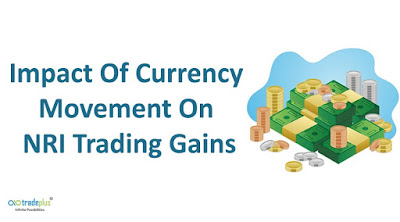What is the impact that currency movement has on NRI online trading gains?
 |
| NRI Online Trading |
A non-resident typically has income in foreign currency and normally invests in India. For an NRI does not look at purely equity returns but also the currency returns. In fact currency fluctuations can leave a deep impact on the NRI equity returns. Let us look at four such cases.
- If an NRI has invested in India and earned returns of 12% on equity, what would be his effective returns? It would depend on the currency movement. If the Indian rupee lost 6% against the US dollar, then the NRI would have earned effective dollar returns of just 6% (12% – 6%).
- On the other hand, if the rupee appreciates, the NRI stands to benefit. Extending the above case, if the rupee had instead appreciated by 4% what would have happened. He would have actually earned 16% (12% + 4%). That is why NRIs investing in India always prefer a strong currency in India.
That is the reason, most NRIs prefer to invest into India at a time when the rupee has weakened and there are hopes of a bounce-back in the rupee. That is when they get the dual benefit of equity returns plus currency returns. A weakening rupee, on the other hand, works against the effective returns of the NRI investing in India.
What is it that NRIs need to know about currency movements?
Here are some broad ideas for NRIs looking to manage their currency risk of investing in India.
When NRIs purchase a stock or mutual fund in India, they are actually placing two bets: one on the stock itself and the other on the currency the stock trades in. Since the NRI would be earning in foreign currency (say dollars) and investing in India in rupees, the issue of conversion arises twice. When the dollar falls and the rupee rises, there is a benefit to the NRI as they can earn more in terms of effective returns combining the returns of the stock and the rupee/dollar.
Historically, the value of the dollar relative to INR follows a cyclical pattern. While the falling dollar has helped NRI investments in India, quite often the dollar strength has also worked against them in the last few years, when there was a lot of risk of money flowing into the US and the Fed rates were rising. For example, sharp corrections in the rupee have been followed by periods of sharp pullbacks too.
Most NRIs themselves admit that their big attraction to invest in India has been more about the currency than about equities over the last few years. While many NRI investors have benefited by owning Indian stocks over the last 20 years, it has actually been their investment in the INR that has performed so well. In fact, if you look back between 2002 and 2012, most of the returns that NRIs earned out of India came from currency and not so much from equities.
NRI investments in Indian equity have increased in the last few years largely because of easier investment facilities and partially because of the attractiveness of the equity/currency combination. This is despite the fact that the SEBI had banned the use of instruments like the overseas corporate bodies (OCBs) after the crisis in 2001.
While the currency portion of the two bets has worked extraordinarily well for U.S. NRIs investing in India, these NRI investors may have to be a little more careful because they are getting into a global situation where the emerging markets across the world are becoming a lot more vulnerable.
How the rupee-dollar movement impacts the NRI online trading profits?

As can be seen from the above table, the dollar returns at 7.3% for the NRI are sharply lower than the rupee returns of 15%. This 7.7% loss in returns is due to the depreciation in the rupee vis-à-vis the US dollar.
Note:
This Content Originally Published By Tradeplusonline. Source Link: https://blog.tradeplusonline.com/nri-trading/what-is-the-impact-that-currency-movement-has-on-nri-online-trading-gains/



Comments
Post a Comment